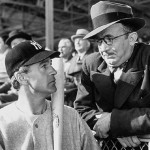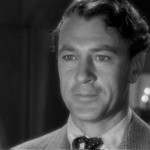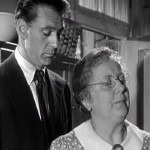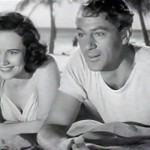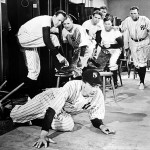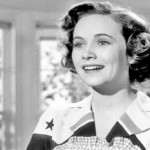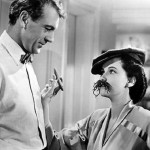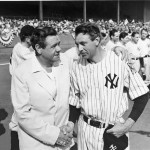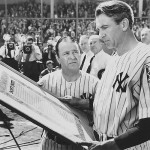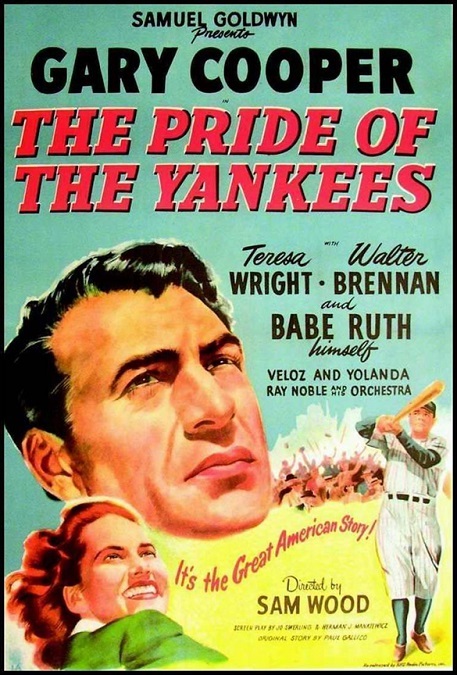
The Pride of the Yankees – 1942
Gary Cooper takes the lead again, this time in a film based on the life of baseball legend, Lou Gehrig. I’ve never been a big fan of the sport, but even I know a great player when I see one, or at least see an actor playing him on the screen. Gehrig was apparently one of the greats. He was more than just a sports super-star. He was apparently a model example of what a fine, upstanding, American citizen should be. He was kind, generous, honest, loyal to his wife, and good at the sport.
But we all know tragedy that took him out of the game after 16 years as a professional athlete. He contracted a disease called amyotrophic lateral sclerosis in 1938. The debilitating illness was not common knowledge at the time, and since then, owing to the fact that he was such a famous public figure, the disease has been named after him. Lou Gehrig’s Disease is a neurodegenerative disorder which causes increasing weakness due to muscles that atrophy. Death is usually cause by the weakening of the muscles needed to breath. Most people with Lou Gehrig’s disease show symptoms in their 60s. Lou died from the disorder at the age of 37.
OK, enough of the biology lesson, and on to Cooper’s performance. I’ll be honest. I have developed a modicum of respect for Gary Cooper as an actor, but I am beginning to get tired of seeing him play the insanely naïve country bumpkin with the heart of gold. Sure, that was the character of Gehrig for most of the film, but come on, Cooper. Branch out and try something different. But I suppose it wasn’t his fault. He produced what the movie-going public of the 1930s and 40s wanted to see, and the studios went out of their way to see that he did. They would never cast him in a darker role, such as a murderer. Studio execs thought that it would ruin his image and cause bad box office results.
That being said, Cooper did just fine. As far as my research could tell me, he remained true to the real-life Gehrig. I was entertained by the film, but I think that the end fell pretty flat, and here’s why. I think that the two most inspirational things about the life of Lou Gehrig were his phenomenal career as a professional baseball player, and his positive attitude in the face of his illness.
However, the film was roughly two hours and ten minutes long. But if you could separate the normally flowing narrative into its different subplots, I’d estimate that it spent about 20 minutes on his childhood and college years, an hour on his career, 40 minutes on his romance and marriage, and 10 minutes on his illness. In fact there was a completely unnecessary scene in which he is out on a date with his girl, during which the audience is treated to the stage show that the couple is watching. About 7 or 8 minutes of singing and dancing that had nothing to do with the plot whatsoever, could have been cut from the movie and nothing would have been lost.
The wonderful Teresa Wright played his wife Eleanor. She is a great actress that I never tire of watching. As usual, she was incredible, and she was able to handle both happy scenes and the sad ones with equal depth and sensitivity, though it was the later scenes that allowed her talents to really shine.
The film did a good job of getting a lot of the details of the real Gehrig’s life right. But one change that was made to make the movie more dramatic than reality, was that the film had Gehrig hiding the prognosis of his illness from his wife. But she was no dummy and figured out that he only had a few years left to live. Knowing that he didn’t want her to know, she pretended that she was ignorant of the severity of his condition. They ended up lying to each other. In reality, she was right there with him, supporting him and caring for him until the end. The sub-plot of lies in the last few minutes of the movie seemed to cheapen things for me.
Another interesting aspect of the film is the fact that the real Babe Ruth, another baseball legend who played with Gehrig, played himself in the film. He did a good enough job, mostly because he didn’t have to act much, but it was interesting to see him try. And lets fact it. He was not an attractive man. Maybe they should have cast Wallace Beery.
I’m giving Pride of the Yankees a mixed review. Cooper did his same old shtick, but did it well. Wright was amazingly good, as usual. But I think that less time should have been spent on Gehrig’s romance with Eleanor, and more time should have been devoted to his illness. It would have been a better and more dramatic film.
